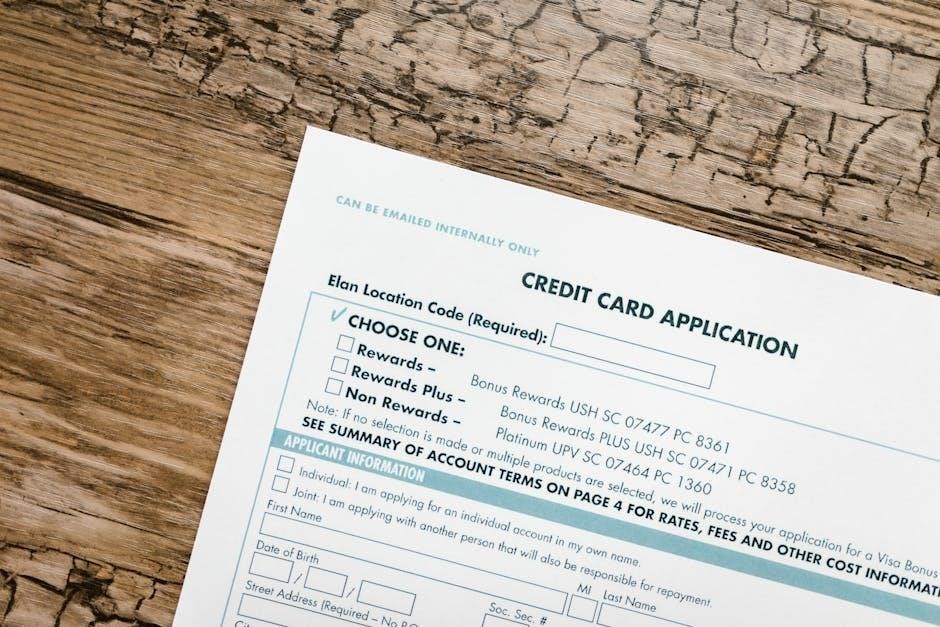new york rental application form
The New York rental application form is a critical document for securing housing in NYC. It requires detailed personal, financial, and rental history information to evaluate eligibility. Landlords use this form to assess potential tenants’ credibility and reliability. Understanding the application process and requirements is essential for a smooth rental experience in New York City’s competitive market.
Overview of the Rental Application Process in NYC
The rental application process in NYC is highly structured and competitive. Prospective tenants typically submit applications through property managers or landlords, providing personal, financial, and rental history details. Applications are reviewed for eligibility, with landlords often using third-party screening services to verify creditworthiness and employment. The process may include interviews or additional documentation requests. Approval times vary, but decisions are usually made within a few business days. Due to the competitive nature of the NYC rental market, applicants are encouraged to act quickly and ensure all required documents are complete. Understanding the process and preparing in advance can significantly improve chances of securing a rental property in the city.
Importance of Understanding the Application Requirements
Understanding the application requirements is crucial for a successful rental application in New York City. Landlords and property managers rely on these documents to assess a tenant’s reliability and financial stability. Missing or incomplete information can delay processing or lead to rejection. Familiarizing oneself with the necessary paperwork, such as proof of income, employment verification, and rental history, ensures a smoother process. Additionally, knowing the legal standards, like fair housing laws, helps applicants recognize their rights and avoid discriminatory practices. Being prepared and informed not only streamlines the application process but also enhances the applicant’s credibility, increasing their chances of securing a desirable property in NYC’s competitive market.

Required Documents for the New York Rental Application
The New York rental application typically requires personal identification, proof of income, employment verification, rental history, and credit information to assess tenant eligibility and financial stability.
Personal Identification and Contact Information
The New York rental application requires applicants to provide personal identification and contact information to verify their identity and establish communication. Typically, this includes a valid government-issued ID, such as a driver’s license or passport, and a Social Security number for background checks. Applicants must also provide their full name, date of birth, and current address. Additionally, landlords may request emergency contact details and proof of residency. Accurate and up-to-date information is crucial, as any discrepancies may delay the application process. This section ensures landlords can verify the applicant’s identity and maintain clear communication throughout the rental process. Providing false information can lead to application denial or legal consequences.
Proof of Income and Employment Verification
Applicants must provide proof of income and employment verification to demonstrate their ability to pay rent. Common documents include recent pay stubs, W-2 forms, or a letter from an employer confirming salary and job tenure. Self-employed individuals may need to submit tax returns or business financial statements. Landlords typically require proof of stable income, often asking for earnings to be at least three times the monthly rent. This step ensures applicants can afford the rental property and meet financial obligations. Providing accurate and detailed income verification is crucial for a successful application. Failure to meet income requirements may result in denial of the rental application.
Rental History and References
Rental history and references are essential components of the New York rental application form. Applicants are typically required to provide the contact information of previous landlords or property managers to verify their tenancy record. A positive rental history demonstrates reliability and responsibility, which are critical for landlords evaluating potential tenants. Additionally, some applications may ask for personal or professional references to further assess an applicant’s credibility. It is important to ensure that all provided references are accurate and reachable, as any discrepancies or unresponsiveness could delay the application process. A clean rental history with no past evictions or unpaid debts greatly strengthens an applicant’s chances of approval.
Credit Check and Financial Information
A credit check and financial information are crucial parts of the New York rental application process. Landlords typically require consent to perform a credit check to assess an applicant’s financial stability and history. This includes reviewing credit scores, payment history, and any outstanding debts. Additionally, applicants may need to provide bank account information to verify their financial standing. A good credit score and stable financial history can significantly improve an applicant’s chances of approval. Landlords use this information to determine if an applicant can manage rent payments responsibly. It is important to ensure all financial details provided are accurate, as any discrepancies could lead to delays or denial of the application.

Sections of the New York Rental Application Form
The New York rental application form includes sections for personal identification, employment details, rental history, financial information, and credit check consent. Each section requires accurate and detailed information.
Demographic Information and Household Members
The New York rental application form typically includes a section for demographic information and household members. This section requires applicants to provide details such as their full name, age, relationship status, and contact information. Additionally, applicants may need to list all household members, including their names, ages, and relationships to the primary applicant. Some forms may also ask for employment status or student status of household members. This information helps landlords assess the suitability of the applicants and ensure compliance with housing regulations. Accurate and complete information is crucial, as any discrepancies may delay or complicate the application process. Providing this information ensures a fair and transparent evaluation of all applicants. Landlords use this data to verify the number of occupants and ensure the property meets legal occupancy standards. This step is essential for maintaining a smooth tenant-landlord relationship and ensuring the property is used as intended.
Current and Previous Rental History
The New York rental application form includes a section for current and previous rental history, which is crucial for landlords to assess potential tenants’ reliability. Applicants are typically required to provide details about their current and past residences, including the addresses, dates of tenancy, and names of landlords or property managers. This information helps landlords verify the applicant’s rental track record and identify any potential red flags, such as evictions or unpaid rent. Additionally, applicants may be asked to explain reasons for moving or provide references from previous landlords. Accurate and complete rental history is essential, as incomplete or misleading information can lead to application delays or denials. This section ensures landlords can evaluate the applicant’s likelihood of being a responsible tenant. Providing truthful and detailed rental history demonstrates credibility and increases the chances of approval.
Employment and Income Details
The New York rental application form requires detailed employment and income information to verify an applicant’s financial stability. Applicants must provide their employer’s name, address, and contact information, along with their job title and length of employment. Proof of income, such as recent pay stubs, W-2 forms, or tax returns, is typically required to confirm earnings. Self-employed individuals may need to submit additional documentation, like bank statements or a letter from a certified public accountant. Landlords use this information to assess whether the applicant’s income is sufficient to cover the rent, often requiring income to be at least three times the monthly rent. Accurate and complete employment and income details are crucial for a successful application, as they demonstrate the applicant’s ability to meet rental obligations responsibly. This section is a key factor in determining tenant eligibility and financial reliability.
Financial Account Information and Credit Check Consent
The New York rental application form requires applicants to provide financial account information, such as bank account numbers and types, to verify financial stability. Landlords use this information to assess the applicant’s ability to manage rental payments consistently. Additionally, applicants are typically asked to consent to a credit check, which evaluates credit history and score. This step helps landlords determine the applicant’s financial reliability and ability to meet long-term rental obligations. Providing accurate bank details and agreeing to a credit check is essential for a smooth application process, as it demonstrates transparency and financial responsibility. This section is a critical component of the rental application, ensuring landlords can make informed decisions about tenant eligibility.
Legal and Regulatory Considerations
The New York rental application process must comply with fair housing laws and tenant rights regulations. Landlords must avoid discriminatory practices and ensure transparency in application requirements and processing.
Fair Housing Laws and Discrimination Protections
Fair housing laws in New York prohibit discrimination based on race, color, religion, gender, sexual orientation, disability, national origin, age, marital status, or familial status. These protections ensure equal access to housing opportunities for all applicants. Landlords must avoid asking inappropriate questions or setting discriminatory criteria during the rental application process. The New York City Human Rights Law further strengthens these protections, penalizing any form of unlawful discrimination. Tenants have the right to file complaints with regulatory agencies if they experience unfair treatment. Understanding these laws is crucial for both landlords and tenants to ensure a fair and transparent rental application process in New York City.
Landlord-Tenant Rights and Responsibilities
In New York, landlords and tenants have clearly defined rights and responsibilities. Landlords are required to maintain habitable living conditions, perform necessary repairs, and adhere to all housing codes. They must also provide proper notice for rent increases or lease terminations. Tenants, in turn, are responsible for paying rent on time, maintaining the property, and complying with lease terms. Both parties are expected to act in good faith and communicate openly. Landlords cannot retaliate against tenants for requesting repairs or exercising their legal rights. Tenants are also protected from unlawful evictions and have the right to a fair hearing in court. Understanding these mutual obligations helps foster a positive and respectful landlord-tenant relationship in New York City.

Submitting and Processing the Application
Submitting a complete application with all required documents ensures timely processing. Landlords typically review credit, references, and financial stability to make informed decisions. Processing times vary but generally range from 24 to 72 hours, depending on the complexity of the application and the landlord’s verification process. Once approved, tenants receive a lease agreement outlining terms and responsibilities. It’s essential to review the lease carefully before signing. Delays may occur if additional information is needed, so applicants should be prepared to provide further documentation promptly. A smooth submission process enhances the chances of securing the desired rental property in New York City’s competitive market.
Application Fees and Processing Times
In New York, rental application fees typically range between $50 to $150, covering credit checks and administrative costs. Processing times vary from 1 to 7 business days, depending on the landlord’s efficiency and the completeness of the application. Some landlords may waive fees, especially in competitive markets. Applicants should ensure all required documents are submitted promptly to avoid delays. Credit checks and reference verifications are common reasons for extended processing times. Understanding these factors helps applicants plan accordingly and improve their chances of securing the rental property. In NYC’s fast-paced rental market, timely submission and responsiveness are crucial for a successful application.
Approval and Denial Criteria
Approval for a New York rental application largely depends on creditworthiness, income stability, and rental history. Landlords typically require a credit score of 650 or higher, though this may vary. Income must often be 3x-4x the monthly rent to ensure affordability. A stable employment history and positive references from previous landlords are also critical. Criminal history may lead to denial, as well as past evictions or unpaid debts. Landlords must comply with fair housing laws, avoiding discrimination based on race, gender, or other protected characteristics. Transparency in the criteria is essential to ensure a fair evaluation process. Meeting these standards increases the likelihood of approval, while missing them may result in denial.
Understanding the New York rental application process is key to securing housing. Prepare thoroughly, gather necessary documents, and review requirements to improve your chances of approval.
Final Tips for a Successful Rental Application
- Ensure all documents are complete and organized to avoid delays.
- Double-check the accuracy of the information provided.
- Be transparent about your financial situation and rental history.
- Apply early, as NYC’s rental market is highly competitive.
- Follow up politely with the landlord or property manager.
- Present yourself as a reliable tenant by being professional and prepared.

